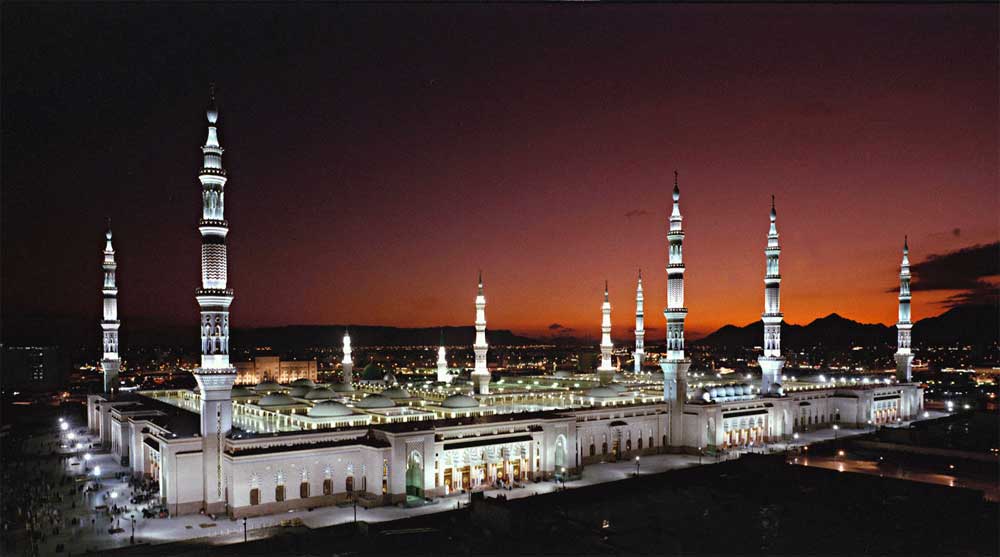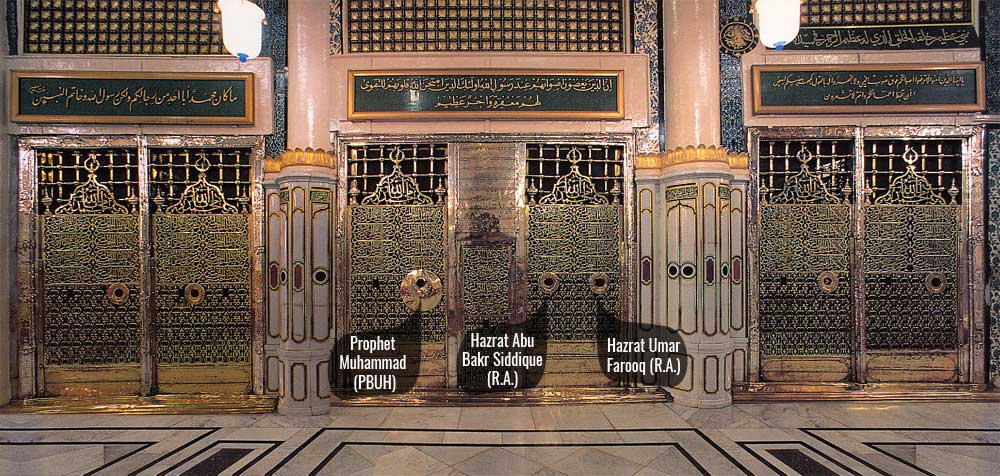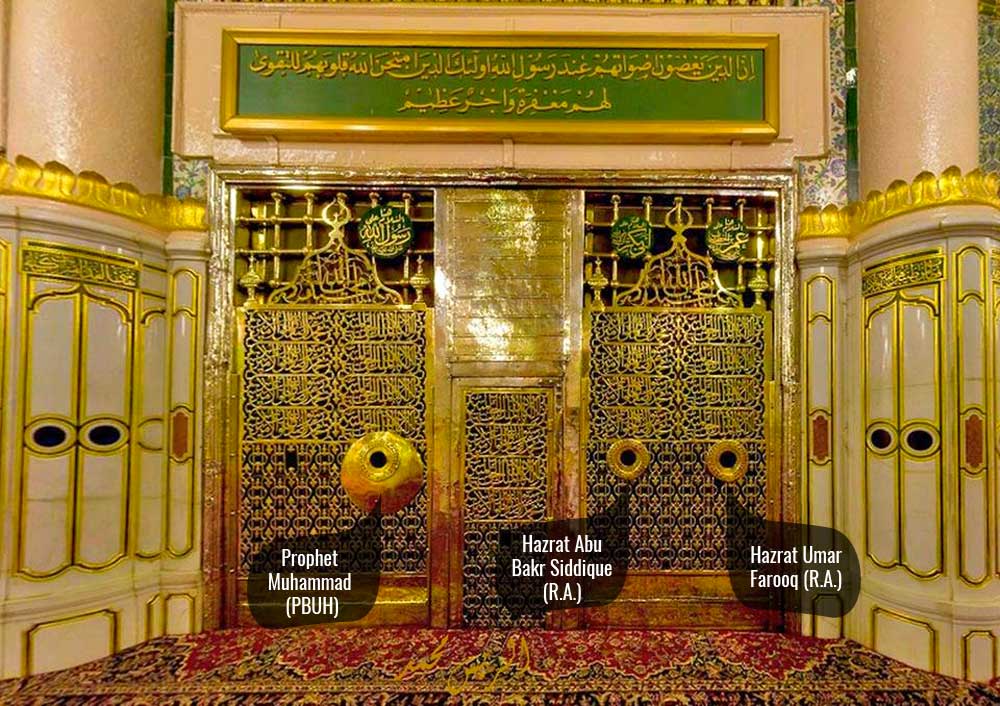Etiquettes of visiting the Prophet’s Mosque & Rawdah

Visiting Medina is not a rite of Hajj or `Umrah, but the unique merits of the Prophet’ s city and his mosque attract every pilgrim to visit it.
Muslims’ hearts are always drawn to the city that witnessed the construction of the edifice of Islam and from which the shining rays of the message spread.
Muslims are always eager to visit the city they have cherished for long and to pray in the mosque established by their beloved Prophet.
Such a visit revives the Muslims’ faith and devotion. They remember the great sacrifices and tireless endeavor of the Prophet (peace and blessings be upon him) and his Companions to deliver to us the invaluable gift of Islam.
Because visiting Medina is not part of Hajj, you may choose whether you will visit Medina, and if so, whether before or after the Hajj or `Umrah.
There is no ihram or Talbiyah for the visit to Medina or the Prophet’ s Mosque.
Merits of Visiting Medina, Prophet's Mosque & the Holy Tomb
Medina is the city that accommodated the Prophet (peace and blessings be upon him) and his Companions when they migrated from Mecca. The Prophet (peace and blessings be upon him) highlighted the merits of Medina:
“ It (Medina) expels the (bad) persons from it, as fire expels the impurities of iron.” (Al-Bukhari)
And he supplicated Allah on its behalf:
“ O Allah! Bestow on Medina twice the blessings You bestowed on Mecca.” (Al-Bukhari)
The Prophet (peace and blessings be upon him) himself participated in the construction of Prophet' s Mosque, called it “ my mosque,” and led prayers in it for years. Visiting this mosque and praying in it are immensely rewarding. The Prophet (peace and blessings be upon him) said,
“ One prayer in my mosque is better than one thousand prayers in any other mosque excepting Al-Masjid Al-Haram (of Mecca).”
According to Hazrat Anas, the Prophet (peace be upon him) has also said:
" The person who offers 40 prayers consecutively in my Mosque, without missing a prayer in between, will secure immunity from the fire of Hell and other torments and also from hypocrisy." (Musnad Ahmad)
It is a great privilege for the pilgrims to visit our beloved Prophet’ s tomb. The Prophet (peace be upon him) once said:
" The person who comes solely for the purpose of paying a visit to my grave, has a right on me that I should intercede for him." (‘ Ilm al-Fiqh, Vol. V)
And he has also said:
" The person who performs Hajj and then visits my Tomb, will be regarded as though he had seen me in my worldly life." (Baihaqi)
Etiquettes of Visiting Prophet’ s Mosque & the Holy Tomb
Travel to Medina and Niyyah:
When you start travel to Medina, Make niyyah (intention) as such:
" O Allah! I start journey to visit the holy tomb of Prophet Muhammad (peace be upon him). Please accept it from me."
During this journey, recite Darud Sharif frequently. When the city of Medina is in sight, show your extreme fondness and excitement and humbly enter the city while reciting Darud and Salam.
Entering Prophet' s Mosque:
After putting your luggage at your residence, take a bath or perform ablutions (vudu), wear nice dress, apply perfume and proceed towards the Prophet’ s Mosque while uttering Darud. Enter the mosque through Bab-e-Jibril or Bab-us-Salaam or if this is not possible, enter through any other door. Place your right foot first in the entrance, praise Allah (such as say Allhu Akbar, Subhan Allah, Alhamdu Lillah, etc.), recite Darud and say:
اللَّهُمَّ افْتَحْ لِي أَبْوَابَ رَحْمَتِكَ
" Allah huma aftah li abwabe rahmate ka"
(Oh Allah open for me the doors of your mercy.)
Two Raka’ t Nafl:
If it is not undesirable (Makrooh) time, offer two rakahs of nafl tahiyyat al-masjid (greeting of the masjid) preferably in Riadh ul Jannah near the tomb of the Prophet or otherwise anywhere else in the mosque.
More Information about Riadh ul Jannah
In front of the Holy Tomb:

In front of the sacred tomb of The Holy Prophet (peace be upon him), there are three sections of brass screens and all three have holes in them. Look at the picture carefully. If you stand in front of the middle section between the pillars, you' ll see a big round hole on your left. This is in front of the face of the Holy Prophet. Adjacent to it is a door that stays closed. Right after it on the right side is a round hole which is in front of the face of Hadrat Abu Bakr Siddique. On the right of it, there is another round hole which is in front of the face of Hadrat Umar Farooq.

Shown above is a close-up of the screens. Standing in front of the sacred face of our beloved Prophet (peace be upon him) and facing it, say in a respectful and hushed voice:
السَّلامُ عَلَيْكَ أَيُّهَا النَّبِيُّ وَرَحْمَةُ اللَّهِ وَبَرَكَاتُهُ
" Assalamu alaika, ayyuhan-nabiyya wa rahmatul-lahi wa barakatuhu"
(Peace be on you, O Prophet, and the mercy and blessings of Allah.)
Then say:
اَلصَّلوٰةُ وَالسَّلاَمُ عَلَيْكَ يَا رَسُوْلَ اللهِ
اَلصَّلوٰةُ وَالسَّلاَمُ عَلَيْكَ يَا نَبِيَّ اللهِ
اَلصَّلوٰةُ وَالسَّلاَمُ عَلَيْكَ يَا حَبِيْبَ اللهِ
"
Assalatu was-salamu alaika ya Rasul-Allah"
"
Assalatu was-salamu alaika ya Nabi-yallah"
"
Assalatu was-salamu alaika ya Habib-Allah"
(Peace be upon you O Messenger of Allah, Peace be upon you O Prophet of Allah, Peace be upon you O Beloved of Allah)
Recite maximum Durood o Salaam as you can as Prophet (peace be upon him) himself listens them in his grave & answers them.
You may also recite the following dua:
رَبَّنَا آتِنَا فِي الدُّنْيَا حَسَنَةً وَ فِي الآخِرَةِ حَسَنَةً وَ قِنَا عَذَابَ النَّار
" Rabbana atina fid-dunya hasanatan wa fil-akhirati hasanatan wa qina azabin-nar."
(Our Lord grant us good in this life and Hereinafter.)
Offering Salam on behalf of others:
Now offer salam of relatives or friends in your own language or say:
...السَّلاَمُ عَلَيْكَ يَا رَسُوْلَ اللهِ مِن
" Asslamu alaika ya Rasul Allah min..."
After the word " min" , add the name of your friend or relative.
Salam on Hazrat Abu Bakr Siddique:
Then move a little to the right and stand before the grave of Hazrat Abu Bakr (may Allah be pleased with him). Greet him and supplicate for him in these words:
السلام عليك يا أبا بكر الصديق ورحمة الله وبركاته , السلام عليك يا خليفة رسول الله صلى الله عليه وسلم وثانيه في الغار , جزاك الله عنا وعن الإسلام والمسلمين خير الجزاء
Salam on Hazrat Umar Farooq:
Again move a little to the right before the grave of Hazrat Umar (may Allah be pleased with him), and greet him and make supplication for him in these words:
السلام عليك يا عمر الفاروق ورحمة الله وبركاته , السلام عليك يا ثاني الخلفاء الراشدين .جزاك الله عنا وعن الإسلام والمسلمين خير الجزاء
Now move away from the tomb towards the outer door & facing Kabaah, supplicate to Allah for good things in this life and the life after death. It is not permissible for the visitor to face the grave during supplication because this is contrary to the practice of the righteous predecessors. Instead, he should face the Qiblah (prayer direction), praise Allah The Almighty, glorify Him and supplicate with what he likes for himself, his parents, relatives, and all other Muslims. It is not permissible to ask the Prophet, (may Allah be pleased with him ), to fulfill one' s needs or alleviate his/her troubles or anything that is to be sought only from Allah The Almighty.
Rawdah Mubarak in Further Detail
Forty Prayers:
The visitor should try his best to perform the obligatory five daily prayers in the Prophet' s Mosque, and utilize his time in much Thikr (remembrance and mentioning of Allah), reciting Quran, supplication and voluntary prayers. These acts command enormous reward. Men should offer forty prayers (Salat) in the Prophet’ s Mosque, but it is not a requirement of any kind. It is only Mustahab, i.e., rewarding if done, but if not done there is no sin.